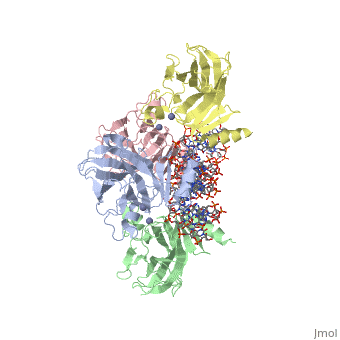We apologize for Proteopedia being slow to respond. For the past two years, a new implementation of Proteopedia has been being built. Soon, it will replace this 18-year old system. All existing content will be moved to the new system at a date that will be announced here.
P63
From Proteopedia
(Difference between revisions)
| Line 1: | Line 1: | ||
<StructureSection load='3us0' size='340' side='right' caption='P63 DNA-binding domain complex with DNA and Zn+2 atoms (grey) (PDB code [[3us0]])' scene=''> | <StructureSection load='3us0' size='340' side='right' caption='P63 DNA-binding domain complex with DNA and Zn+2 atoms (grey) (PDB code [[3us0]])' scene=''> | ||
| - | '''P63''' is a tumor protein belonging to the P53 family. It is a multi-isoform protein required for epidermal development. One isoform of P63 is involved in skin development and stem/progenitor cell regulation. Another isoform functions in apoptosis. P63 domains structure is similar to that of P53 with an N-terminal transactivation domain (TAD) followed by proline-rich region, DNA-binding domain (DBD) and tetramerization domain. In addition, the P63 contains an additional C-terminal region with SAM (Sterile a-Motif) and transactivation inhibitory domains. The SAM domain is involved in protein-protein interactions. | ||
| - | |||
== Function == | == Function == | ||
| + | |||
| + | '''P63''' is a tumor protein belonging to the P53 family. It is a multi-isoform protein required for epidermal development<ref>PMID:10594758</ref>. One isoform of P63 is involved in skin development and stem/progenitor cell regulation. Another isoform functions in apoptosis. P63 domains structure is similar to that of P53 with an N-terminal transactivation domain (TAD) followed by proline-rich region, DNA-binding domain (DBD) and tetramerization domain. In addition, the P63 contains an additional C-terminal region with SAM (Sterile a-Motif) and transactivation inhibitory domains. The SAM domain is involved in protein-protein interactions. | ||
== Disease == | == Disease == | ||
| - | Mutations in P63 result in cleft lip or palate syndromes, split hand/foot malformation or ectodermal dysplasia. | + | Mutations in P63 result in cleft lip or palate syndromes, split hand/foot malformation or ectodermal dysplasia<ref>PMID:16740912</ref>, <ref>PMID:23407076</ref>. |
== Relevance == | == Relevance == | ||
Revision as of 10:00, 13 June 2016
| |||||||||||
3D Structures of P63
Updated on 13-June-2016
References
- ↑ Parsa R, Yang A, McKeon F, Green H. Association of p63 with proliferative potential in normal and neoplastic human keratinocytes. J Invest Dermatol. 1999 Dec;113(6):1099-105. PMID:10594758 doi:http://dx.doi.org/10.1046/j.1523-1747.1999.00780.x
- ↑ Leoyklang P, Siriwan P, Shotelersuk V. A mutation of the p63 gene in non-syndromic cleft lip. J Med Genet. 2006 Jun;43(6):e28. PMID:16740912 doi:43/6/e28
- ↑ Tadini G, Santagada F, Brena M, Pezzani L, Nannini P. Ectodermal dysplasias: the p63 tail. G Ital Dermatol Venereol. 2013 Feb;148(1):53-8. PMID:23407076

